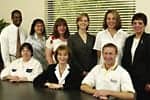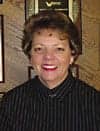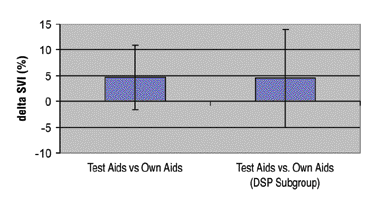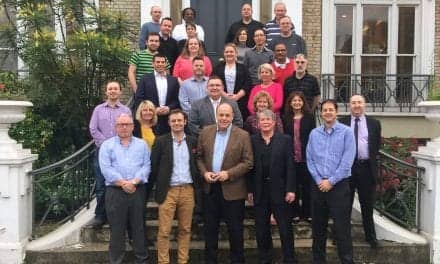 In an age when many companies try to be all things to all people, Audina Hearing Instruments, Orlando, Fla, takes pride in doing one thing very well—manufacturing hearing aids. It is a deliberate strategy that has allowed the small company to compete alongside the international giants that dominate the hearing instrument market. “We never wanted to be the biggest company in the world,” says Frank Robilotta, co-owner and executive vice president of Audina.
In an age when many companies try to be all things to all people, Audina Hearing Instruments, Orlando, Fla, takes pride in doing one thing very well—manufacturing hearing aids. It is a deliberate strategy that has allowed the small company to compete alongside the international giants that dominate the hearing instrument market. “We never wanted to be the biggest company in the world,” says Frank Robilotta, co-owner and executive vice president of Audina.
Since founding Audina with company president Marc McLarnon in January 1990, Robilotta and the company’s staff of 100 have focused on creating a quality product with a strong support network. The approach is one emphasizing good business over flashiness. “We try to take a very simple approach to doing business,” says Robilotta.

All manufacturing, sales, and support are conducted from Audina’s headquarters in Orlando. The company offers hearing devices ranging from entry-level BTEs to advanced digital CIC devices.
Unlike the larger hearing instrument companies, Audina has not been responsible for developing any of the technology it uses. Robilotta readily admits that the company is not technologically innovative, but does not see this as a negative. “We’re not innovators,” he says. “The companies like Gennum and RTI are developing the digital technology, the digital chips, which allows companies like ours to compete technologically with the bigger companies.” However, the company does develop its own products using the existing technology. It also manufactures prewired faceplates, which it sells all over the world.

The majority of the sales staff are located at Audina’s Orlando headquarters. Sales are carried out exclusively via the telephone.
Though Audina might not be a technologically innovative company like its competitors, it stands out in other ways, primarily the way it services its hearing instruments.
The Name of the Game: Service
Where Audina tries to be innovative is in its service. “We try to hang our hat on the customer service aspect of the business,” says Robilotta. “We feel that, as these big companies get bigger, personal, one-on-one service is what is usually sacrificed. I still believe that this is a very personal business. You shouldn’t be wowed when you get good customer service and that’s becoming commonplace.”

Customers who call Audina will not be shuttled from one automated voice menu to another. Instead a live person answers the phone, ready to assist the customer. “Anytime the phone rings, it is a request for us to do something,” says Robilotta. “How well and how quickly we respond to that is tantamount to our success. So, if I can give you the same product that you can get anywhere else, service is what it comes down to. [At the end of the day, what matters is] ‘What is my relationship with my supplier on a day-to-day basis, handling situations that arise between those who are dispensing and the suppliers.’”

Service is what differentiates Audina from its competitors, says Robilotta. “I sell hearing aids today the way I did 25 years ago; that hasn’t changed,” he adds. “Yes, there is new technology, yes, there is smaller technology, but it’s still a very personal one-on-one business. We have a tremendous amount of continuity here at the company.” This continuity of service has been aided by the fact that many of the company’s employees have worked both for Audina and together—like owners Robilotta and McLarnon who first worked together at another hearing instrument company—for decades.
Customer service consists of more than being available on the telephone. It is designed to support the hearing instruments in a number of ways, including training and assisting with fitting questions, software, or computer problems. “Pretty much anytime the phone rings here, the people on the sales/marketing side of the company want you to pick up the phone. And if you can’t help [the customer], connect them with somebody who can help them; we’ve built the infrastructure to take care of it,” says Robilotta. “We have the people—the audiology staff, the computer software people, the computer hardware people that are here to answer the questions and to help to train.”
Robilotta sees this dedication to service as part of his responsibility as a manufacturer. “Here we’re on the phone trying to get these people to buy our product; I think it’s also the responsibility of the manufacturer to provide the training to not only effectively sell the product, but fit the product,” he says.
If a problem cannot be solved over the telephone, Audina responds quickly and thoroughly. “We’re constantly monitoring our turnaround times,” says Robilotta. “We keep records of what’s done on every repair that comes in here…so we can see if there are any trends. We can respond to the problems quickly. I think that one of the advantages of being a small company in relation to some of the larger companies is that we can move a lot quicker.”
Service has become such a big part of what Audina does that it will be rolling out a new program in April at the annual meeting of the American Academy of Audiologists (AAA), in Salt Lake City.

“Yes, We Can”
The new campaign, reflecting Audina’s problem-solving approach to customer service, is called “Yes, We Can.” It will include numerous materials, including brochures, handouts, and other items. “[‘Yes, We Can’], I think, is the answer that has to be given when someone calls their supplier,” says Robilotta. “It’s a request for us to do something. You have to say, ‘Yeah, I can do that.’ And we’re trying to instill that throughout the company. We stress the point that it can’t just be words. It has to be an attitude.”
But improved service is not the only thing that Audina will be introducing at the show. It will also be debuting a new hearing instrument, the Instinct. The custom digital product line will be available in a range of designs from full shell to CIC. “This includes some of the latest technology that has some of the newer features—feedback elimination and noise reduction capabilities,” says Robilotta. “It puts us on par with the higher end digital products that many of the other larger manufacturers are offering.”
Even with the new products and commitment to service, there are things at Audina that will not change. “We’re going to continue to do what we’ve been doing because it’s been working,” says Robilotta. “It always comes down to how we can do more of it in the same amount of time.”
Robilotta does not expect Audina to be as large as the company’s competitors, but he still sees room to grow the company while not losing its customer-service focus. “I think you can still grow, and I think you can still get bigger and still [have good customer service],” he says. “We feel that we’ve put together a system, and we understand the system so that as we grow we can add the personnel and still maintain that live personal one-on-one.”
N. L. Shepherd is a contributing writer for Hearing Products Report.




